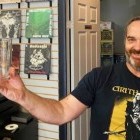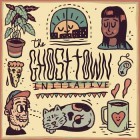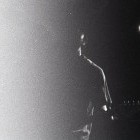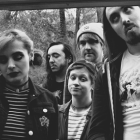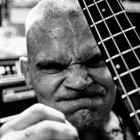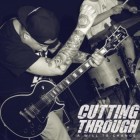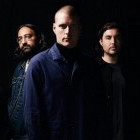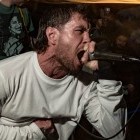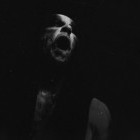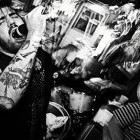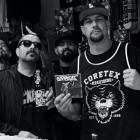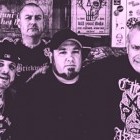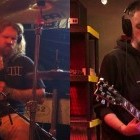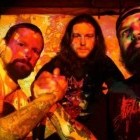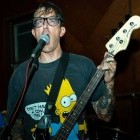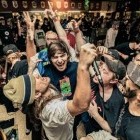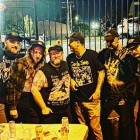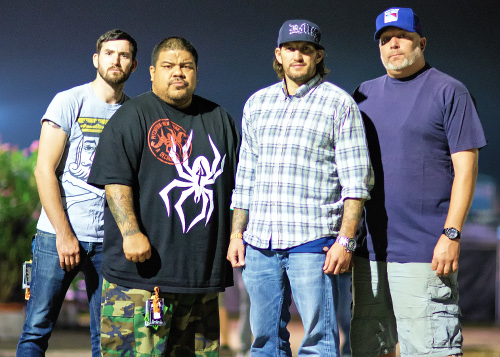
By the time he entered junior high school in the late '80s, Freddy Cricien was already a seasoned vet of the underground hardcore punk touring circuit. The younger brother of Agnostic Front vocalist Roger Miret, Cricien started tagging along on tour while he was still in his single digits. When he was 12, a few members of Agnostic Front helped Cricien start Madball, a hardcore band that he fronts to this day.
Throughout the years, Cricien has branched out with other musical projects. 2004 saw him joining forces with members of H2O, New Found Glory, and the Cro-Mags to form Hazen Street, a group that released one album on Epic Records that same year. In 2009, he released Catholic Guilt, a hip-hop album which found him working with DJ Stress. Cricien is also part of Black N' Blue Productions, a New York-based company behind live events like the annual BNB Bowl.
Currently touring in support of Madball's eighth studio album, Hardcore Lives, I caught up with Cricien to get the lowdown on his upbringing, hardcore, and the band's "tough guy" reputation.
I wanted to start off with your upbringing. Like you, my father is from Colombia. In our home, my dad subscribed to the old school machismo way of raising a family. What was your experience like?
Yeah, my pops was an old school cat in many ways. He didn't mess around either, if he felt "disrespected," or if the "laws of the land" were broken, you'd feel his wrath. It wasn't The Brady Bunch, let's just say that. Don't get me wrong, he had a cool side as well. But, as I'm sure you know, that Colombian temper is nothing to mess with. Unfortunately, I inherited some of that, and it's a hard task to keep it in check at times.
That said, when it comes to fatherhood, I have a way different approach. I'm not judging, just stating the facts. That's what we're supposed to do, right? We learn from their mistakes and try harder. They did some things right, and some wrong. We'll make mistakes as well, I'm sure, but not the same ones.
Did your family play any non-Latino music in the house when you were really young?
When it comes to my parents, that's [Latino music] all they played [laughs]. They had some exceptions, but mostly it was Latino music. My older brothers and sister had many records from all types of genres, so that's how I was exposed to pretty much everything.
What kind of music did you gravitate towards early on?
I gravitated towards everything! I was just very taken by music in general. I absorbed it all. Obviously, with regard to hardcore, I was exposed to it through my bro, Roger, and, well, the rest is history. I loved hip-hop very much. I used to pop and lock and breakdance with my friends. I also briefly dabbled in graf. I really just loved the whole hip-hop culture. Those were the two main things I gravitated towards on a real cultural level, but I loved a little bit of everything.
You started going out on the road with Agnostic Front at a really young age. Was your family worried about you taking the first trip?
Yes, very young, 7 or 8 years old. Sure, my fam was worried, especially my mom. The first trip I was actually staying with family in Jersey, where I'm originally from. It was a normal summer trip. Roger had moved from Jersey to the Lower East Side of Manhattan. He came to scoop me up for a few days, but no one had any idea of how he was living [laughs]. It was an amazing experience. It's kind of crazy because he was young himself, about 18. But he had gone off on his own and had already done so much by the time he got into the hardcore scene, so there was this perception that he was grown, that he was mature, but really he was still a kid himself.
Legally speaking, he was an adult, and he always watched out for me, and of course so did all the guys that were around back then. People like Raybeez, Vinnie Stigma, and Jimmy Gestapo. This original trip was strictly Lower East Side, but later on I went on many excursions throughout the east coast and Midwest. My fam trusted Roger and nothing ever happened to me, so all good.
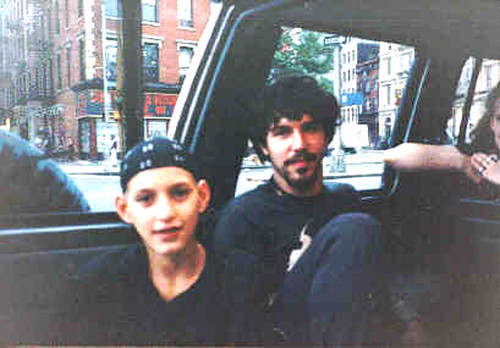
These were the earlier days of the American D.I.Y. touring circuit, and I know bands would often play in some sketchy kind of places. Let alone the places bands would stay at to sleep. Did you go through any kind of culture shock on the first tour you went out on?
I experienced those early D.I.Y. tours first hand, yes. There was nothing glamorous or luxurious about it. It was all very grimy and wild. That's what it was then. I watched Agnostic Front play storage units that became makeshift clubs at night. Basements? You know it. They also played regular clubs, of course. The real crazy thing is that it hasn't changed that dramatically [laughs]. At least in the States it hasn't. I could remember crashing at people's houses, and if it was too hectic my bro and I would just go out and sleep in the van. We had hotels, too. We also stayed with friends and family. We did whatever it took. AF paid a lot of dues, and still does. We're all very much part of the "working class" of the music world.
Did you meet a lot of other Latinos out on those early tours? When you go to a hardcore or metal show these days, there are tons of us in the crowd, but it wasn't always like that.
In places like New York City and New Jersey, there were always some Latinos scattered about. I'm sure down the east coast they were sprinkled in here and there; in Miami for sure. But not like how it is now.
SEE ALSO: The Hispanic Impact on the Early New York Hardcore Scene, by Freddy Alva
Madball got off the ground when you were 12. Here you were, a member of a band that hardcore fans throughout the world knew about. Did you find it tough relating to other kids your age since you were rolling with adults, playing in a band?
"Off the ground" might not be the best description [laughs]. I mean, we released something and I had AF backing me and co-signing the whole thing, so that obviously didn't hurt. But that really didn't translate to an instant worldwide fanbase. It was a novelty thing that some liked and some didn't. This is a niche scene of music, and Madball was a very minuscule piece of the puzzle at that stage, at least in my opinion. As far as relating to kids my age, some of my friends got it, while others couldn't relate and also couldn't care less. At 12 I was an outcast in many ways. Having my band didn't really bring new friends or popularity. Maybe if it was this day and age, with social media and the accessibility of everything, I'd be cool now [laughs].
You have to remember that a lot of kids didn't understand our scene of music. My hair was growing out from having it shaved all summer and I'd be rocking an AF shirt and skater shoes and people thought I was straight weird. Nowadays you're cool if you're a kid and have a band. I didn't really get that experience unless I came across someone that understood that world. Later on, when I was about 16, and still in school, we [Madball] dropped the second 7" and there ended up being a couple of hardcore kids that went to school with me. That was kind of cool. One of them ended up in Warzone.
I grew up in the same neighborhood as the guys in Dmize did, and they were a big deal for us. So it was cool to see Hoya join Madball in time for the Set it Off album. How did you guys know each other before he joined the band?
Ah, so you grew up in the Corona/Jackson Heights area, cool. Hoya and I met through my friend Ezec [Crown of Thornz, Skarhead], I believe, whom I met through Toby Morse [H2O, Hazen Street]. We all bonded on a friendship level and then when I needed a bass player to take Roger's spot, naturally Hoya was the obvious choice. Dmize was breaking up anyway. It worked out for everyone. That definitely changed the course for us as well, musically speaking. Hoya brought that metallic groove flavor into the mix, which is obviously a big part of our sound, along with the more traditional hardcore elements.
SEE ALSO: 2014 interview with Dmize guitarist Rob "Beto" Rosario.
Once Madball starting touring, did you find it hard to adjust to the physical toll it took on your voice, or did it come naturally to you since you had already been a road warrior from a young age?
Just to clarify, I was never given singing lessons throughout my life, not even by my brother [laughs]. Neither was he! I learned the hard way. "Just yell as loud and as hard as you can, kid, and see what happens!" It was very barbaric type of shit. Then add puberty into the mix! Over the years I pretty much taught myself to balance out the tone and grit in my voice, and how to project it. But it took a few records, at least. I probably ruined my vocal cords way before I got it figured out. On the road it held up for the most part, miraculously.
Oh, I have another funny thing to add. I was in a video by Melissa Cross, who is a wonderful vocal coach. It's an instructional vid for heavy music singers. Anyway, it was the first time I had gone for lessons. My friend Toby brought me and [Madball guitarist] Mitts there around the time we were doing Hazen Street. We were trying to step our game up [laughs]. He had gone to her for years and loved her. So, we're in this lesson and all of the sudden a camera crew shows up. As if it weren't awkward enough. She asked if it was cool to record us. She's so nice, so it's hard to say no. So now we end up in this documentary/instructional video thing. Meanwhile, it was my first and only lesson [laughs]. I will say she did give me some good tips, and I recommend it if you're in a position to do it. I have people approach me all the time about that vid. I'm like, "If they only knew..." I would love to go back some time, though. I probably could use it.
In the middle of all the stuff you having going on with Madball, you became part of Black N' Blue Productions. Can you tell us about your role there and what we can expect from the company in the coming year?
Cuz Joe and I started Black N' Blue together. I guess "co-founder" is the proper description, if you want to get specific [laughs]. It really started as a platform to bring back the old school Superbowl of Hardcore shows. NYC was really missing that, and we needed an event to celebrate our culture. Those shows had died out and we wanted to bring it back. Now BNB is a legit production company and we do many events throughout the year. The BNB Bowl is still the main event, though. We also consult on production matters for other shows; security, logistics, etc. It's a work in progress, but I see a bright future for BNB. The best part about it is it's still tied into everything else I'm involved in.
SEE ALSO: The Heavy Metal Roots of New York Hardcore, by Freddy Alva
Like the Ramones, or most of Motörhead's discography, Madball's sound hasn't veered away much from its first album. You've stayed consistent that way. Many hardcore and punk bands (SSD, Crumbsuckers) went off into different stylistic directions during their careers. Why is it important to you and the rest of the band to keep Madball true to its original sound?
I don't know that we stayed true to our original sound, if you're using our first release, Ball of Destruction, as a reference. But, yeah, we have sort of stayed the course from about Set it Off on. Although, if you A/B Set it Off and Hardcore Lives, they are very different albums. But, yes, the "Madball sound" is there. That's because once we found our lane, and it felt right to us, we tried to just improve upon it. We're still trying to do that! We never changed drastically or dramatically because Madball started as a NYHC band and it will always be that. Even if we go on to do other things in the music realm, as far as Madball, we'll always remain hardcore. It would be weird otherwise, wouldn't you say? Now, don't get me wrong, I'm all for evolution and I think we certainly have evolved with every release, musically, lyrically, and stylistically. That said, as you become known and respected for a certain style and sound, it really becomes harder and harder to stray away. The growth has to be done tactfully and tastefully. It sometimes sucks. But at least we have an identity.
Let's talk about Hardcore Lives. The band tracked with Unearth's Ken Susi, but you produced your vocal tracks with a guy named Jonathan Nuñez at a different studio in Miami. Why did you go that route, and did you get to spend more time on your performances compared to previous albums?
Well, I was down in Florida with my family. I've been spending a lot more time down that way these days. Both my wife and I have family there and have roots in southern Florida. Anyway, it was easier and more cost effective at that point to do something there. I had discovered Jon's studio through a good friend of mine, Dougie. I did a few things there in the past and liked it. Jon is easy to work with and quick behind the board. Plus, I'm finding that I enjoy being solo when I do vocals. It's not a shy thing. These guys have seen me record many times, especially Hoya. But it's more of a pressure thing. If I can go in on my own time and not have that pressure of people being there and this or that, I work better. Time-wise I really didn't have more time allotted. It was more about the setup and the freedom I had, for lack of a better way to say it. Hopefully people dig the end result. It wasn't a power trip thing either, let me add that. It's not like I mind having the guys there or a producer—a second or third, fourth ear, whatever. I just really knew what I needed to do with this particular release. I had a vision, I guess you can say, and this was the best way to execute it. That may change next time around.
I talked about your sound keeping close to its origins, but there's a song on the new album called "Doc Marten Stomp" that has an Oi! feel to it.
Hoya wrote the music for that a while back, but we changed up some things structurally. We also added some new guitar riffs to it. He and I had discussed doing some tracks with a little more Oi! flavor. We love that style, and I think when you mix it with hardcore, tastefully, it can be cool. We were going to do an EP with just those types of tracks. The EP ended up not happening, but we got "Doc Marten Stomp" out of it and I'm happy it turned out the way it did. Lyrically speaking, it's an ode to my extended family, the DMS crew. Enough said.
Tell me about the song "Mi Palabra." It's definitely not the first song Madball has recorded that features Spanish lyrics.
Nope, and it's not the first or the last time either. We really enjoy doing these types of tracks. The song is generally about living by your word, hence the title "My Word" or "Mi Palabra." It has many layers. The lyrics are not just one aspect of living by your words. It covers a few things. It's about not just talking about things but actually doing them. Backing up what you say or feel, whatever that may be. Just existing is not necessarily living, that's what the chorus says, basically. We're living in a time where people don't interact as much. People are not accountable for as much in their words or actions. I'm just calling it how I see it from my perspective and back 'round. I'm old-fashioned in a lot of ways, I guess you can say.
Did you have to refer to an English to Spanish dictionary at any point?
As far as using a dictionary, listen, man, I use a dictionary sometimes for English [laughs]. Anyone who says they don't is either a genius or a liar. I'm self-taught as far as writing and reading Spanish goes. No one sat with me and taught me verbs, nouns, conjugations, etc. We just spoke it at home. You have to remember, Spanish was my first language growing up. My parents didn't really speak English. My siblings did, so in my house, my first language was Spanish, but growing up in America, and being an American, I was going to naturally speak English as well. To answer your question, yes, I referenced things, but I can't sit there and write a whole song out of the dictionary. That's very unnatural in any language.
The last thing I wanted to talk you about was Madball's reputation in some circles as a "tough guy" band. How do you feel about that perception? Was it a fair assessment on you guys years ago, or has it always been a lot of bullshit?
I get tired of hearing about all of the different sub-subgenres that people are coming up with these days, within our own scene. It wasn't always like that. There were always guys in the scene that were rougher around the edges than others and people just knew that. But there were no labels put on it. If they happened to play music you liked, you supported it, that's that. Some of the "rough or tough" guys were some of the most polite people. All these labels are corny to me, in general. Not just as it relates to Madball. Too many people have too much to say and very little to do, apparently. We have always been genuine guys for better or for worse. Real. I know it's a cliché thing to say and that word is misused often, but I'd be lying if I said otherwise. We've always kept it authentic with everything we do, even it if was something that yielded a negative result or outcome. Mind you, we've made plenty of mistakes along the way that we've learned from, well, for the most part [laughs]. Things that are regrettable and others that are not because they needed to happen. It's all part of the learning process.
By us keeping it authentic with our music, and in our daily lives, we sometimes were judged, even ostracized. Maybe we were too real for some. One thing I will say, we always come with respect if we're treated as such. That applies to the old me and the new. Straight up. We weren't doing knucklehead shit just for kicks or to live up to some sort of hype or persona. What you saw was what you got with us, and that's still the case. It's just now we're in a different place in our lives and essentially we're different people in certain ways. I do think we are finally outgrowing the "tough guy" stigma, but then again, it's still widely used. Hey, if you get us great, but if you don't, guess what, you don't have to listen or partake. We're a NYHC band that has always kept it honest, like us or not.
***
Hardcore Lives is out now via Nuclear Blast/The BNB Label, and available in their online store.

